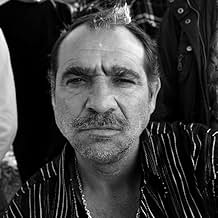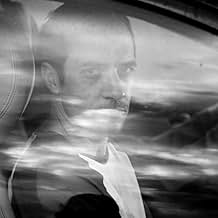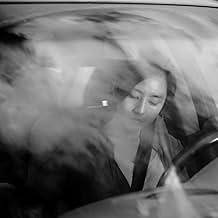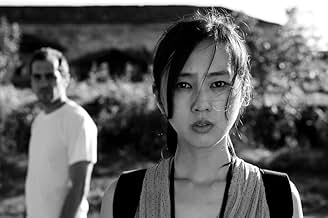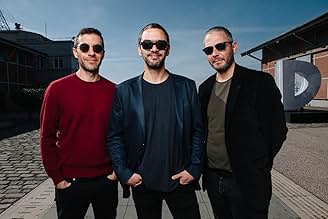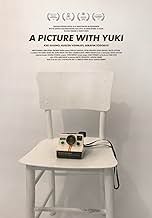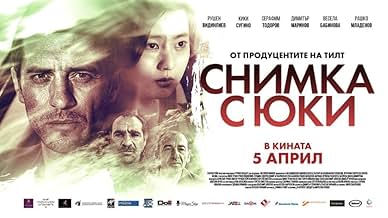Ein bulgarischer Mann und seine japanische Frau unterziehen sich der dritten IVF Behandlung. Um zur Ruhe zu kommen, fahren sie ein paar Tage aufs Land, aber ein tragischer Vorfall sorgt dafü... Alles lesenEin bulgarischer Mann und seine japanische Frau unterziehen sich der dritten IVF Behandlung. Um zur Ruhe zu kommen, fahren sie ein paar Tage aufs Land, aber ein tragischer Vorfall sorgt dafür, dass nichts mehr so ist, wie es war.Ein bulgarischer Mann und seine japanische Frau unterziehen sich der dritten IVF Behandlung. Um zur Ruhe zu kommen, fahren sie ein paar Tage aufs Land, aber ein tragischer Vorfall sorgt dafür, dass nichts mehr so ist, wie es war.
- Regie
- Drehbuch
- Hauptbesetzung
- Auszeichnungen
- 8 Gewinne & 5 Nominierungen insgesamt
Empfohlene Bewertungen
I wanted to enjoy A Picture With Yuki more than I did. But that doesn't mean you shouldn't watch it. (At the time of writing, it was showing on Netflix here in Bulgaria.)
Yes, it's flawed. The chemistry between the two leads never feels convincing. Yes, there's call for a certain awkwardness given the setting of the film. But the awkwardness on view feels more due to the two leads' limited acting abilities than to any situational awkwardness. And while I have no objection in principle to films with a languid pace, the pace of A Picture With Yuki can occasionally feel positively glacial.
Those are the obvious flaws. Yet at its best - and there are several excellent scenes - A Picture With Yuki offers a fascinating window into the troubled relationship between the Bulgarian and Romany communities in rural Bulgaria. It touches on pride, guilt, suspicion and prejudice, and features compelling, painfully human performances by a grieving Romany couple. They are the real stars of this film, not the awkward charisma-free leads.
Certainly worth watching - especially if, like us, you're visiting Bulgaria and want to understand the country and its people better.
Yes, it's flawed. The chemistry between the two leads never feels convincing. Yes, there's call for a certain awkwardness given the setting of the film. But the awkwardness on view feels more due to the two leads' limited acting abilities than to any situational awkwardness. And while I have no objection in principle to films with a languid pace, the pace of A Picture With Yuki can occasionally feel positively glacial.
Those are the obvious flaws. Yet at its best - and there are several excellent scenes - A Picture With Yuki offers a fascinating window into the troubled relationship between the Bulgarian and Romany communities in rural Bulgaria. It touches on pride, guilt, suspicion and prejudice, and features compelling, painfully human performances by a grieving Romany couple. They are the real stars of this film, not the awkward charisma-free leads.
Certainly worth watching - especially if, like us, you're visiting Bulgaria and want to understand the country and its people better.
This is definitely a movie which is worth watching. It is deep, the actors are good and I very much enjoyed watching it.
8OJT
This film was so much better than expected. It's really well told, and has a nerve that keeps you engaged through the story, right from start to end.
A Bulgarian man living in Canada takes his Japanese wife, who struggles to get pregnant back with him to Bulgaria. He shouldn't have. It goes all wrong from the start. The family isn't at all welcoming, and when they leave to live in a cabin, the catastrophe happens.
The story is told with a nerve that is both chilling and eerie, and you'll keep watching to the end to find out what happens.
The film which is a Bulgarian - Japanese co-production written by the director Lachezar Avramov is both in English and Bulgarian.
Well worth your time!
A Bulgarian man living in Canada takes his Japanese wife, who struggles to get pregnant back with him to Bulgaria. He shouldn't have. It goes all wrong from the start. The family isn't at all welcoming, and when they leave to live in a cabin, the catastrophe happens.
The story is told with a nerve that is both chilling and eerie, and you'll keep watching to the end to find out what happens.
The film which is a Bulgarian - Japanese co-production written by the director Lachezar Avramov is both in English and Bulgarian.
Well worth your time!
Wow! A Bulgarian/Japanese co-production. Bulgarian and Japanese films score high for me from a psychological perspective, so this combination created high expectations and turns out to be one out of category.
There are times when I look for movies that turn my emotions upside down in a pleasant way and this one has totally overwhelmed me. Maybe I'm overenthusiastic and have to wait a little longer with this review, but then I will have sunk back into my rational analytical state.
Well, it's now a day later, emotions have calmed down, but I'm still impressed. But what have I seen, or better, what have I experienced. It will take some effort to this without giving away too much of the story, but I'll manage.
The focus of this movie is the collision between cultures, not only Bulgarian and Japanese culture, but also that of gypsies. The story is subtly and minimalistically portrayed and you could summarize it in one sentence: 'How do we deal with responsibility?' The answer to that question is beautifully featured here - image and music - from each of the three cultures point of view.
The gypsies exemplify emotions and associated rituals. Deep emotions, the strongest of which may be grieve or even revenge. The camera work is breathtaking. Especially in the close-ups of the faces, which force you, as it were, to read the unspoken thoughts. The faces of the gypsies, scarred by the hard life, make a deep impression. The slow close-ups, without spoken words, but with music that has been reduced to a heartbreaking sound, have more effect than a hundred words. I imagine that these are authentic gypsies supplemented with actors, who fitted in seamlessly.
Bulgarian culture, or is it more Western culture in general, is represented by Georgi (Ruscen Vidinliev). He returns (temporarily) to Bulgaria after a long stay in Canada, where he also met his Japanese wife Yuki (Kiki Sugino). He looks at the situation through a rational lens and he conflicts with his wife, who grew up with traditions and must remain faithful to them at all times, even if you have to sacrifice yourself for it.
Yuki, who is already struggling because she does not understand the Bulgarian language and is seen as a curiosity in the village, is thrown back into her essence as a result of the event. The scene in which she can do nothing but act according to Japanese tradition, reminds me of a Japanese masterpiece from 1983; The Ballad of Narayama.
I have been served at my beck and call, turned upside down emotions, even a day later. Wow!
There are times when I look for movies that turn my emotions upside down in a pleasant way and this one has totally overwhelmed me. Maybe I'm overenthusiastic and have to wait a little longer with this review, but then I will have sunk back into my rational analytical state.
Well, it's now a day later, emotions have calmed down, but I'm still impressed. But what have I seen, or better, what have I experienced. It will take some effort to this without giving away too much of the story, but I'll manage.
The focus of this movie is the collision between cultures, not only Bulgarian and Japanese culture, but also that of gypsies. The story is subtly and minimalistically portrayed and you could summarize it in one sentence: 'How do we deal with responsibility?' The answer to that question is beautifully featured here - image and music - from each of the three cultures point of view.
The gypsies exemplify emotions and associated rituals. Deep emotions, the strongest of which may be grieve or even revenge. The camera work is breathtaking. Especially in the close-ups of the faces, which force you, as it were, to read the unspoken thoughts. The faces of the gypsies, scarred by the hard life, make a deep impression. The slow close-ups, without spoken words, but with music that has been reduced to a heartbreaking sound, have more effect than a hundred words. I imagine that these are authentic gypsies supplemented with actors, who fitted in seamlessly.
Bulgarian culture, or is it more Western culture in general, is represented by Georgi (Ruscen Vidinliev). He returns (temporarily) to Bulgaria after a long stay in Canada, where he also met his Japanese wife Yuki (Kiki Sugino). He looks at the situation through a rational lens and he conflicts with his wife, who grew up with traditions and must remain faithful to them at all times, even if you have to sacrifice yourself for it.
Yuki, who is already struggling because she does not understand the Bulgarian language and is seen as a curiosity in the village, is thrown back into her essence as a result of the event. The scene in which she can do nothing but act according to Japanese tradition, reminds me of a Japanese masterpiece from 1983; The Ballad of Narayama.
I have been served at my beck and call, turned upside down emotions, even a day later. Wow!
Beautifully shot, meaningful and poignant - I truly enjoyed this movie. The story slowly unfolds through thoughtful camera work, a good ratio of dialogue-to-visual storytelling, convincing performances and a great editing touch. Themes and symbols that emerge early on in the movie play an important part in it throughout, there is a great attention to detail here and nothing is without purpose.
Georgi and Yuki, a Bulgarian/Japanese married couple living together in Canada, wish to have a child and decide to attempt in vitro procedures in Bulgaria. The relationship with Georgi's family is strained and the couple decides to spend time at Georgi's grandparents' house in the mountains instead. Upon arriving there, however, Georgi and Yuki get into a road accident that triggers intense feelings of guilt and remorse, ultimately challenging their moral and personal values, as well as their relationship. Being faced with the choice to overcome their fear of punishment or to run away, Georgi and Yuki's differing views, and their moral and cultural backgrounds are brought to light.
'A Picture with Yuki' is a rewarding experience for the patient and thoughtful viewer who does not shy away from emotionally challenging or sensitive topics. Highly recommended.
Top-Auswahl
Melde dich zum Bewerten an und greife auf die Watchlist für personalisierte Empfehlungen zu.
- How long is A Picture with Yuki?Powered by Alexa
Details
Box Office
- Weltweiter Bruttoertrag
- 17.834 $
- Laufzeit1 Stunde 50 Minuten
- Farbe
Zu dieser Seite beitragen
Bearbeitung vorschlagen oder fehlenden Inhalt hinzufügen


